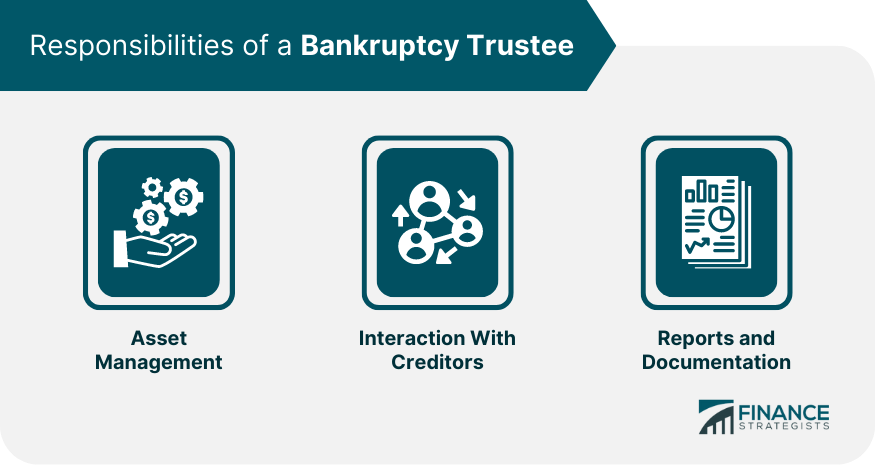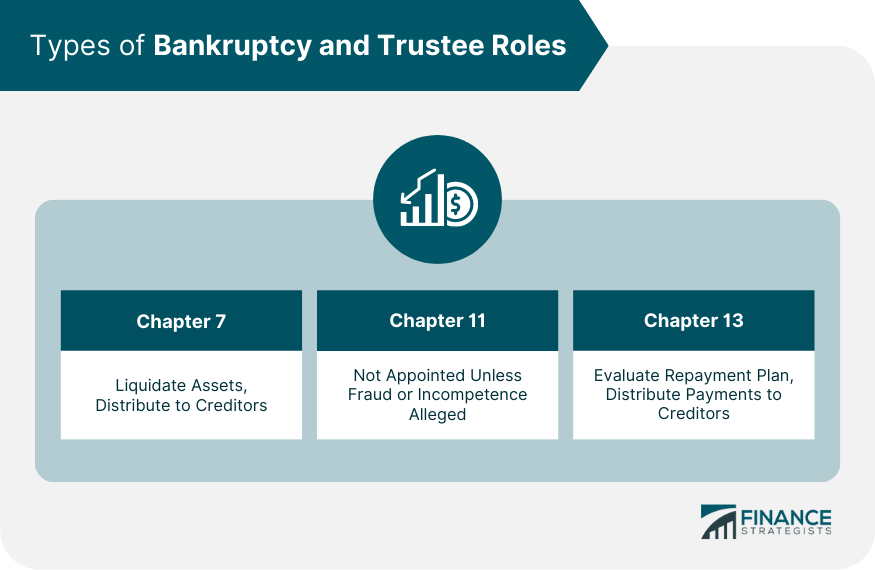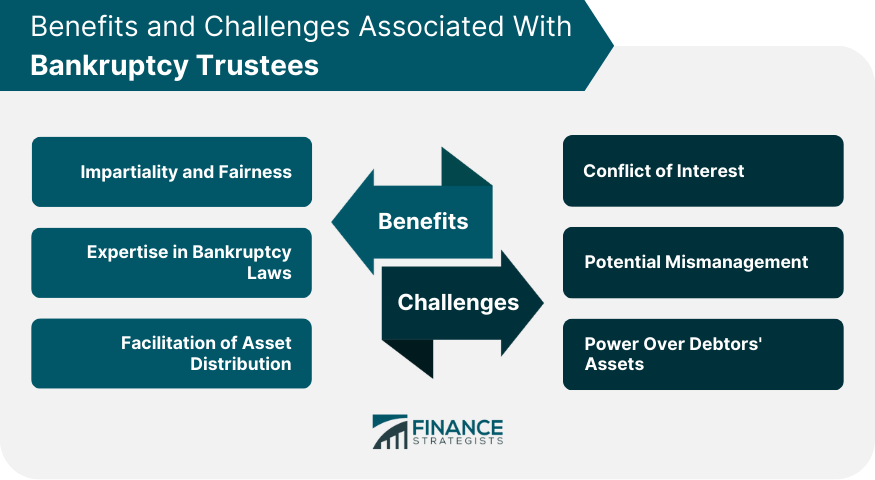A bankruptcy trustee is an individual or entity assigned by the court in a bankruptcy case. These trustees play a crucial role in handling the bankruptcy process, serving as intermediaries between the debtor and the creditors. Their job is not just administrative; they have legal obligations and rights to ensure the fair and equitable distribution of the debtor's assets. The purpose and importance of a bankruptcy trustee cannot be overstated. They not only manage the debtor's assets but also verify and represent the interests of the creditors, ensuring that all procedures and processes align with the law. The presence of a bankruptcy trustee guarantees that the bankruptcy process is handled correctly and transparently, offering a sense of relief and fairness to all parties involved. One of the primary responsibilities of a bankruptcy trustee is to manage the debtor's assets. Upon filing for bankruptcy, the debtor's assets become a part of the bankruptcy estate, managed by the trustee. The trustee has the authority to liquidate these assets to repay the creditors. However, not all assets can be liquidated. Exemptions, determined by state and federal laws, ensure that debtors can keep certain types of property, allowing them to rebuild their lives after bankruptcy. Bankruptcy trustees also interact with creditors. They are responsible for evaluating the claims made by creditors and deciding the validity of these claims. Trustees arrange and oversee meetings of creditors, where creditors can question the debtor under oath about their financial circumstances. Trustees have a duty to provide regular reports to the court and the parties involved. These reports contain detailed information on how the trustee is managing the estate, the funds collected, how these funds have been distributed among creditors, and any remaining assets or pending issues. In Chapter 7 bankruptcy, the trustee's role is mostly to liquidate the debtor's non-exempt assets and distribute the proceeds to creditors. In most Chapter 7 cases, however, the debtor's assets are exempt or already pledged to secured creditors, leaving little or no assets to distribute. Chapter 11 bankruptcy, often used by businesses, allows for the debtor to reorganize and propose a plan to repay creditors over time. Here, a trustee is not usually appointed unless there are allegations of fraud or incompetence. In Chapter 13 bankruptcy, debtors with a regular income can develop a plan to repay all or part of their debts over three to five years. The trustee's role here is to evaluate and potentially object to the repayment plan and then distribute payments to creditors according to the approved plan. Bankruptcy trustees act as a neutral party between the debtor and creditors. Their primary role is to ensure fair treatment to all creditors and to prevent the debtor from favoring certain creditors over others. Trustees bring expertise in bankruptcy law and procedure, which helps make the bankruptcy process more efficient. They also provide a safeguard against fraud, investigating the debtor's financial affairs for any sign of misconduct. Trustees facilitate the orderly distribution of the debtor's assets. They evaluate, liquidate, and distribute assets, ensuring that creditors receive as much as possible given the debtor's financial circumstances. While bankruptcy trustees are supposed to act as neutral parties, there can be situations where a perceived conflict of interest may arise. For example, because trustees earn a commission based on the amount of assets they can liquidate, they may have an incentive to liquidate more assets than necessary. Like any other professional, trustees are not immune to errors or mismanagement. Mismanagement of a debtor's estate could result in reduced payments to creditors. Debtors may find it challenging to give up control over their assets to a trustee. This loss of control is often a source of anxiety and stress during the bankruptcy process. In Chapter 13 bankruptcy, trustees work with the debtor to formulate a repayment plan. This plan outlines how the debtor will pay back their debts over a period, typically three to five years. Trustees also play a crucial role in ensuring that debtors adhere to their repayment plans. If a debtor fails to make the payments specified in the plan, the trustee can ask the court to dismiss the bankruptcy case. Trustees can help debtors adjust their repayment plans if their financial circumstances change. For example, if a debtor loses their job, the trustee can work with them to propose a modified plan to the court. Bankruptcy trustees are appointed and overseen by the United States Trustee Program, a component of the Department of Justice. The U.S. Trustee appoints and supervises private trustees to administer Chapter 7, 12, and 13 bankruptcy estates. Bankruptcy trustees have significant powers, including the ability to sell a debtor's assets or recover fraudulent transfers. However, their powers are not unlimited. They must follow the procedures outlined in the Bankruptcy Code and are answerable to the court and the U.S. Trustee. The actions of bankruptcy trustees have a significant impact on both creditors and debtors. By liquidating assets and distributing proceeds, trustees ensure that creditors receive as much payment as possible. For debtors, trustees play a key role in helping them navigate the bankruptcy process, and their actions can significantly affect the debtor's financial recovery. Understanding the role and responsibilities of a bankruptcy trustee can help individuals better navigate the bankruptcy process. Being prepared and knowing what to expect can reduce stress and improve outcomes. Many misconceptions surround the role of bankruptcy trustees. Understanding that trustees are there to help ensure a fair and orderly process rather than to punish the debtor can help set appropriate expectations. Cooperating with the trustee is crucial for a smooth bankruptcy process. Debtors should be honest and complete in their financial disclosures, respond promptly to trustee requests, and fulfill all their duties under the Bankruptcy Code. A bankruptcy trustee is a critical figure in the bankruptcy process, serving as the bridge between debtors and creditors. With their primary role in managing assets, validating creditors' claims, and reporting to the court, trustees ensure an organized, transparent, and lawful process. Depending on the type of bankruptcy, the trustee's responsibilities can differ significantly. Their presence ensures impartiality, expertise, and orderly distribution of assets. However, potential challenges such as conflicts of interest, mismanagement, and the stress of asset control transfer can arise. Therefore, understanding the role of the trustee, preparing for the process, and maintaining open, honest communication are essential for a smooth bankruptcy procedure. This understanding clears common misconceptions and helps establish realistic expectations, facilitating a more favorable outcome for all parties involved.What Is a Bankruptcy Trustee?
Responsibilities of a Bankruptcy Trustee
Asset Management
Interaction With Creditors
Report and Documentation

Types of Bankruptcy and Trustee Roles
Chapter 7 Bankruptcy
Chapter 11 Bankruptcy
Chapter 13 Bankruptcy

Benefits of Bankruptcy Trustees
Impartiality and Fairness
Expertise in Bankruptcy Laws
Facilitation of Asset Distribution
Challenges Associated With Bankruptcy Trustees
Conflict of Interest
Potential Mismanagement
Power Over Debtors' Assets

Bankruptcy Trustees in Debt Repayment Plans
Formulate Repayment Plans
Ensure Plan Adherence
Make Adjustments and Modifications
Legal Framework Around Bankruptcy Trustees
Trustee Appointment and Oversight
Legal Limitations and Powers
Impact on Creditors and Debtors
Navigating Bankruptcy With a Trustee
Prepare for the Process
Clear Common Misconceptions
Essential Tips and Best Practices
Bottom Line
Bankruptcy Trustee FAQs
A bankruptcy trustee serves as an intermediary between the debtor and the creditors during a bankruptcy case. They manage the debtor's assets, verify and represent the creditors' interests, and ensure all procedures follow the law.
Once a debtor files for bankruptcy, their assets become part of the bankruptcy estate, which the trustee manages. The trustee has the authority to liquidate these assets, except for certain types of property exempted by state and federal laws, to repay the creditors.
The benefits include ensuring impartiality and fairness in the bankruptcy process, providing expertise in bankruptcy laws and procedures, and facilitating the orderly distribution of the debtor's assets to creditors.
Challenges can include potential conflicts of interest, the possibility of mismanagement, and the stress experienced by debtors due to the loss of control over their assets.
In a Chapter 13 bankruptcy, the trustee works with the debtor to formulate a repayment plan, ensures that the debtor adheres to the plan, and can help modify the plan if the debtor's financial circumstances change.
True Tamplin is a published author, public speaker, CEO of UpDigital, and founder of Finance Strategists.
True is a Certified Educator in Personal Finance (CEPF®), author of The Handy Financial Ratios Guide, a member of the Society for Advancing Business Editing and Writing, contributes to his financial education site, Finance Strategists, and has spoken to various financial communities such as the CFA Institute, as well as university students like his Alma mater, Biola University, where he received a bachelor of science in business and data analytics.
To learn more about True, visit his personal website or view his author profiles on Amazon, Nasdaq and Forbes.











